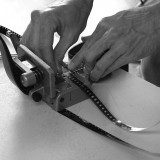The Act of Becoming
As much as it pains him to admit it, Hanson has failed. He has not been living up to his preconceived purpose of moving to Berlin, a chance to reinvent himself, to discover the truth, and to put it more bluntly, to have a taste of boys. He moved to Berlin in October 2018, and it took a cold evening in June the year later for him to become acutely aware of how much he had failed what he had promised for himself. It seems that a million miles away from home, with five years of added wisdom since college, Hanson is still suffering from an inhibition to experience joy, as if the very act of enjoying oneself would signify a betrayal that would trigger an avalanche of consequences, a habit of thoughts that was ingrained in him since childhood. And as much as he would like to believe that with the help of therapy and friends and the sexual awakening he had experienced from the year before, the reality is far more complicated. Einstein once said that one cannot solve the problem with the same level of consciousness that created that problem. Unfortunately for Hanson, he had been trying to solve his problems with the same mindset, only now with an added awareness of his ineptitude due to therapy and mediation. What’s the point of awareness if it only adds to the suffering? They keep saying awareness is the first step towards change, then why is change so hard?
Hanson had a vague memory of that evening when he was sitting in the beautiful library in HU studying German, yet he was unable to sustain any focus. He felt a weight in his chest, unlike the ones he had felt before and stared into the blank space. And it was in this silence that Hanson admitted to himself that he had failed. He had failed so miserably. He was repeating the same mistakes in college. By wrapping his life around studies and obligations, he conveniently ignored anything that’s related to fun and labeled them as corrupt in an attempt to hide the fear that had been building up in his body since the beginning of time itself. In the face of fear, he hides behind rationalization and the pursuit of knowledge, simultaneously feeding his ego and appease the hidden trace of fear that is never acknowledged in daylight. Something had to change, yet he did not know how. But at the very least, he refused to indulge in his self-pity and embrace the old way of depression. Hanson had chosen not to harbor negative emotions anymore, though that intention had been constantly challenged.
Yet change did happen, with the help of alcohol and substance. That was only part of the story, of course. And in the process of change, one must create a personal myth. The myth that Hanson wrote for himself was that he learned to embrace his femininity.
One night he went out to a club with his new roommate Grant, an American working in the film industry whom he had met the year before in the job that brought him to Berlin. And in that club, perhaps with the help of alcohol and months of repression, Hanson danced in the most provocative way that was beyond his understanding. It seemed that for the longest time Hanson had been living in two separate truth, a truth of the mind, and a truth of the body. In that moment in time under the spotlight in a techno club in the Eastern region of Berlin, a sector that used to be occupied by Soviet Union, Hanson understood how the truth of his body is the gateway towards the transformation that he so desperately desired. Berlin is perhaps heaven in that regard because in that club no one was judging. Hanson felt a sense of support with good spirit as he dropped his glasses multiple times and there were always people helping him to find it. In that dance when he expressed himself through every inch of his body, he realized his internalized sexism, mostly from his mother, is at the core of his inhibition, the inability to enjoy the many facets that is sexuality. Hanson thought that he had accepted his gayness throughout all these years, but it never occurred to him that acceptance and denial can happen in the same terrain in which one only accepts what one is willing to accept. In that case, Hanson was willing to accept that fact that he liked boys, and the many social and cultural implications of the word “gay,” but he was unwilling to accept his femininity. In many ways, such form of acceptance is perhaps the most dangerous kind, for it uses the mask of truth as a liberation without acknowledging that it’s only a partial truth, similar to the popular Chinese proverb in which a group of blind people was trying to feel an elephant with their hands. Each of them touches a different part of the animal, and each of them naturally arrives at a different conclusion. They are all correct, of course, but none of them has acquired the full knowledge of the truth. Such is the danger of blindness, for we can be so fervent in our beliefs that we don’t even realize that we have been living in lies, not out of deliberate deceptions, but out of ignorance, or a hidden deception made by a fear that the rational mind is unable to register. In the case of Hanson, he had realized during the night at the club that he had denied his femininity for so long, and to truly set himself free, this was the part he needed to accept. Not just accepting, but to embrace it with all the love he could find in this body and beyond.
The week after, Hanson decided to try again to get into Berghain, the infamous Berlin night club that used to be a power station in the Soviet-occupied East Germany and is now known for the music, the parties that last days, and the high rejection rate at the door. There seems to be a constant myth in terms of how one could get in. In fact, Hanson had previously tried to get in three times and had all been rejected. Once by himself, when his friend told him that being Asian is easier to get in. That was not the case. The other time with friends, when another friend told him that you are more likely to get in with girls. Wrong again. The third time was with Grant. After the rejection he tried to comfort Hanson by saying “It’s not your fault” but the very fact of saying those words made Hanson go down a rabbit hole in which he questioned everything he hated about himself as well as everything he thought what the bouncer would’ve hated about him, as if by listing every possible feature would help him to gain some clarity. The human tendency to create a narrative out of everything is an inherent bias, and this bias was telling Hanson that maybe he was not hip enough to get into Berghain. Maybe it would never happen. But somehow Hanson knew in his heart that he could not get in by being the old Hanson, a version of himself in which he wore glasses and sporty clothes in the least sexual way possible. He can only get in by being the new Hanson, a version of himself that had not yet come into being.
The Friday after, Hanson went to Berghain alone in drag, with make-up on his face and some womanly clothes he salvaged from TK Maxx thirty minutes before closing. The fact that he was the only guy buying stuff on the women floor didn’t bother him that much, for his shabby student clothes made him look like he was buying something for other people. At least that’s what he chose to tell himself that night. He wasn’t wrong though, for the new Hanson couldn’t possibly be the same person as the old Hanson. The fact that nobody stared at him also helped. Thank God for the apathy of the Germans and their disinterest in the world beyond their own as compensation for the national guilt since the war. One could use such historical context as a fit-for-all explanation for everything that is related to the German society today, which is just as accurate as trying to see China only through the lens of communism and the rising GDP that would one day outshine every other country on planet earth. The reality is, of course, much harder to grasp.
He waited in line, somehow knowing that he would get in, and started to dread how he would feel afterward. For so long, Bergain had been this place that would transform a person by offering them the night of their lives. At least that’s what Hanson heard from his friends, though at this point he should have questioned his friends’ opinion and stop taking them at their face values. What if it was just a normal night? No matter what his experience turned out to be, his life from a narrative point of view would forever be turned into two parts, one part pre-Berghain, and one part post-Berghain, whether he liked it or not. He wasn’t dreading the new experience, but he was dreading how this new experience could fit into his narrative, a narcissistic task rooted in the instincts of a writer that is destined to be inaccurate, for one could never fully understand the implication of any experience unless one went through with it.
Hanson did get in. And as much as he would like to say he honored the femininity that was in him, he found the experience less enjoyable without the help of substances like the week before in that small and un-famous club. He was completely sober this time, even took a shot of espresso before leaving the house. And while walking through different areas inside Berghain and seeing that not all people were attractive, some even looked straight-up appalling, Hanson once again felt how our biases towards meaning-making and story-forming are at the very core of our beings. You see, since Hanson was rejected three times before, he had this notion that only “cool” people could get in. Now that Hanson did get in himself and realizing that maybe there was randomness in the selection process, his rational brain was going crazy, for how could randomness allow him to be rejected three times in a row? There had to be something more profound to explain the rejections that he had already interpreted as signs of his failure to live a truthful life, right? The more he felt this way, the more he wanted to laugh at his insecurities, for fear has no dimensions. It’s always the same thing over and over again. Hanson should have known the futility of worrying at this point, for it is only the extension of his coping mechanism against fear. But only under this specific context, when he was walking around in a dark space with ear-drowning music in the background, Hanson started to really see the voices in his head with compassion and a sense of amusement. It was amusing to him how he had allowed these voices to dictate his life for so long, and how inadequate they were to describe the complexity of life, which most of the time defies any kind of interpretations.
After two hours of continuous dancing, he decided to go home. First, he bought a bottle of cola and drank it alone among groups of people who were also sitting down. After he finished the drink he wondered if he should walk upstairs and return the bottle to the bartender or just leave it around and let someone else clean it up. The new Hanson, the rebellious one who was trying to have a straight cut from his past, would probably just leave it somewhere and bounce. But the Hanson at that moment, being a responsible person that he had always been, decided to go up and drop it at a more convenient location for pick-up. Right after he returned the bottle, he saw this attractive guy walking past him, and he cannot help but stare at him. Before Hanson could register that he had been staring at this guy involuntarily, he touched Hanson’s shoulder and spoke into his ear in German. It was loud, so Hanson asked him to repeat it again. Upon repeating Hanson realized he was not able to understand him not due to to the noise but due to his inadequate German skills. He apologized in German about how terrible his German was, and the guy repeated in English, asking if Hanson had viagra or if he knew anyone here that might have it on him. Hanson said sorry, I don’t have it. A brief silence ensued, during which Hanson examined him more closely and became increasingly aroused by his thin lips, his big eyes, and his muscular physiques hidden beneath the clothes. He then walked away, rather slowly, and Hanson patted on his shoulder in silence as a way of encouragement, of solidarity, of compassion, and as the only acceptable way to touch another man he knew of. A minute later, when he went back to the dancing pool, he started to experience a sense of deep longing and regret. He should have said more. He should have flirted. I don’t have viagra. But if you need help, I would be more than happy to oblige. An insinuation for blow-job or hand-job. The fact that Hanson had done neither of these two activities was irrelevant. All he wanted was to flirt, to get his attention, to please him. Then he remembered how he replied with a rather low and manly voice, a voice in which he was used to in daily life but a mismatch to the make-up he wore that night. He wondered if he used a more feminine voice, things might have been different. Hanson had always felt more confident in flirtations with the help of femininity. But that part of him had been denied for so long, and when the situation arose, he naturally went back to the way he was used to. It was at that moment that Hanson realized change is not something that happens after an epiphany. Change is a process, built action by action, choice by choice, through the interactions with real life and real people. Only through practice and living as the new person could one become the new person. In a sense, the art of being the new you is the art of becoming the new you. It is not a fixed moment in time, but a continued movement in time. As Hanson moves forward, he needs to get used to the idea of motions, the idea of lying on a boat that floats through a river. He also needs to remember to be patient, to pause when new circumstances arise, for in that extended space between stimulus and reaction lies the ability to decide, the possibility to step into the future, the chance to become the new you. And through each act, we become our future.
Thinking back on the experience, to the moment when Hanson looked at the cute guy in the eyes, a pulsing sensation would spread through his body, a feeling that makes him feel alive and gives him the will to live. It seemed that even by experiencing this tiny fragment of joy, all those years of sufferings instantly became dust in the wind. Hanson went back to the library to study a few days later, but he no longer felt trapped. Perhaps by admitting he had failed, he started the change that he needed. He cannot believe that he would say this, but he had never been more excited about making more mistakes. The failure to flirt with the cute guy was part of the lessons he needed to become the new person that he had always wanted to be. And he is so very grateful to be alive, right here and right now in this moment in time, hungry for more.












There’s an ACT between awareness and change, my dear friend . Don’t think too much just listen to your heart instead of your mind and do it with the thought you might fuck it up but still FUCK IT.
I wrote that paragraph right after finishing reading your first paragraph and I’m much more proud of you after reading the whole article.
You will make it when you make it. Sometimes all you need is not to solely wait but to wait on a purpose
And I will do whatever you need and whenever you need me /hug hug/